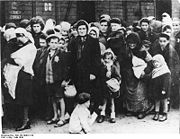- University education in Nazi Germany
-
This article discusses universities in Nazi Germany.
Contents
The Nazification of German universities
April 8, 1933 - a memorandum to Nazi Student Organizations proposed that culturally destructive books from public, state and university libraries be collected and burned. The Deutsche Studentenschaft (German Students' Association) started its anti-Semitic action. In May 1933 books from university libraries, written by anti-Nazi or Jewish authors, were burned in squares, e.g. in Berlin, and the curricula were subsequently modified. Jewish professors and students were expelled according to the racial policy of Nazi Germany, see also the Law for the Restoration of the Professional Civil Service. Martin Heidegger became the rector of Freiburg University, where he delivered a number of Nazi speeches, see Heidegger and Nazism. On August 21, 1933 Heidegger established the Führer-principle at the university, later he was appointed Führer of Freiburg University.
Expelled professors
- Albert Einstein
- Max Born
- Fritz Haber
- Otto Fritz Meyerhof
- Theodor W. Adorno
- Martin Buber
- Ernst Bloch
- Max Horkheimer
- Ernst Cassirer
- Herbert Marcuse
Austrian universities
University of Vienna was involved in Nazism. Between 1938 and 1945 more than 173 professors and consultants were dismissed from the faculty of medicine. Eduard Pernkopf, Rector 1943-1945, compiled the atlas, "Topographical Anatomy of the Human Being". The university obtained over 12,300 bodies, of which 1377 were victims of Nazis, some of which may have been used by Pernkopf as the basis for illustrations [1]. Hans Sedlmayr, a declared Nazi, led an art institute throughout the war.
Nazi professors
Paul Kluke worked for German intelligence in France administered Saarland. Institut für Agrarwesen und Agrarpolitik der Berliner Universität (Institute for Agriculture and Agricultural Policy of the Humboldt University of Berlin) cooperated with Nazi government in designing mass expulsions of the Generalplan Ost. Professors involved in Nazi planning were e.g.: Hermann Aubin, Theodor Schieder, Werner Conze. Historian, SS-Hauptsturmfuehrer Kurt Lueck was killed by partisans during his Nazi activities in Ukraine. Karl Stumpp was assigned to the Ukraine to record political and ethnic affiliations of the remaining population after the exterminations of communists, Jews and others had already occurred. Georg Leibbrandt and Emil Meynen were experts during the Holocaust, Leibbrandt attended the Wannsee Conference in 1942.
Paul Rostock (1892–1956) was Chief of the Office for Medical Science and Research (Amtschef der Dienststelle Medizinische Wissenschaft und Forschung) under Third Reich Commissioner Karl Brandt and a Full Professor, Medical Doctorate, Medical Superintendent of the University of Berlin Surgical Clinic. Charged of human experimentation during the Doctors' Trial, acquitted.
Eugen Fischer (1874–1967), appointed by Hitler rector of the University of Berlin, was one of the leading theorists of scientific racism.
Germanized universities
The first Reichsuniversität started to work in Prague, November 4, 1939.
The University of Poznań was closed by the Nazi Occupation in 1939. It was reopened 1941 under the name of "Reichsuniversität Posen", as a "Grenzlanduniversität", aligned with the Nazi occupation forces' ideology. Its faculty included SS-Hauptsturmführer Reinhard Wittram and SS-Untersturmführer Ernst Petersen, who was a professor of the Department of Prehistory for one year, and anatomist Hermann Voss. Psychologist Rudolf Hippius worked on Nazi deportations. It ceased operations in 1944.
The University of Strasbourg was transferred to Clermont-Ferrand in 1939 and Reichsuniversität Straßburg existed 1941–1944. As Dean of the Medical School, August Hirt constituted a collection of 86 "Jewish skeletons" by organizing the transfer of Auschwitz prisoners who were subsequently murdered in the Natzweiler-Struthof concentration camp.[2]
References
- ^ http://www.case.edu/artsci/dittrick/site2/museum/online/Nazi/Pernkopf.html
- ^ Hildebrandt S. (November 2009). "Anatomy in the Third Reich: an outline, part 1. National Socialist politics, anatomical institutions, and anatomists". Clinical Anatatomy 22 (8): pp. 883-93. http://deepblue.lib.umich.edu/bitstream/2027.42/64328/1/20872_ftp.pdf.
Sources
- When books burn
- Historiker im Nationalsozialismus... by Ingo Haar
- Strasbourg,Medicine
- Teresa Wróblewska: Die Reichsuniversitäten Posen, Prag und Strassburg als Modelle nationalsozialistischer Hochschulen in den von Deutschland besetzten Gebieten, Marszalek, Toruń 2000. ISBN 83-7174-674-1
Categories:- Education in Germany
- Nazi Germany
- The Holocaust in Germany
Wikimedia Foundation. 2010.

